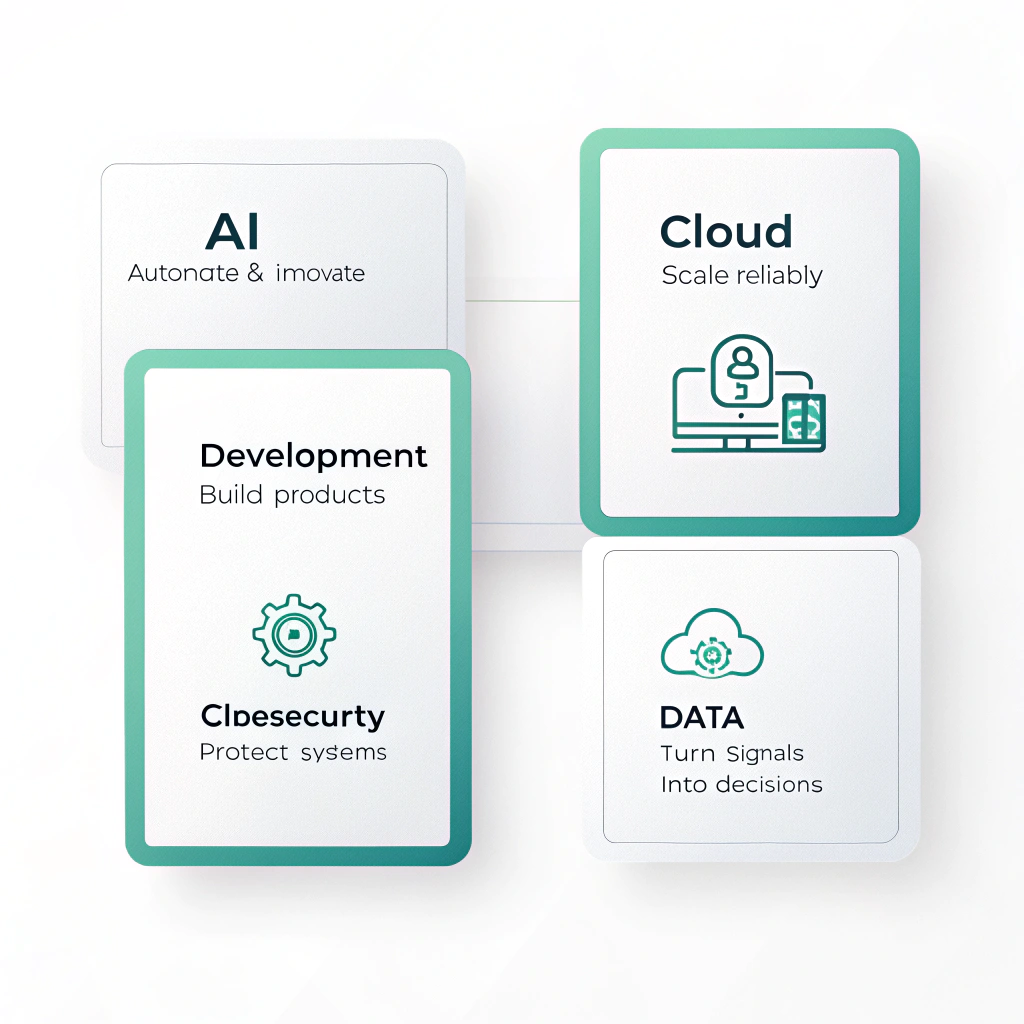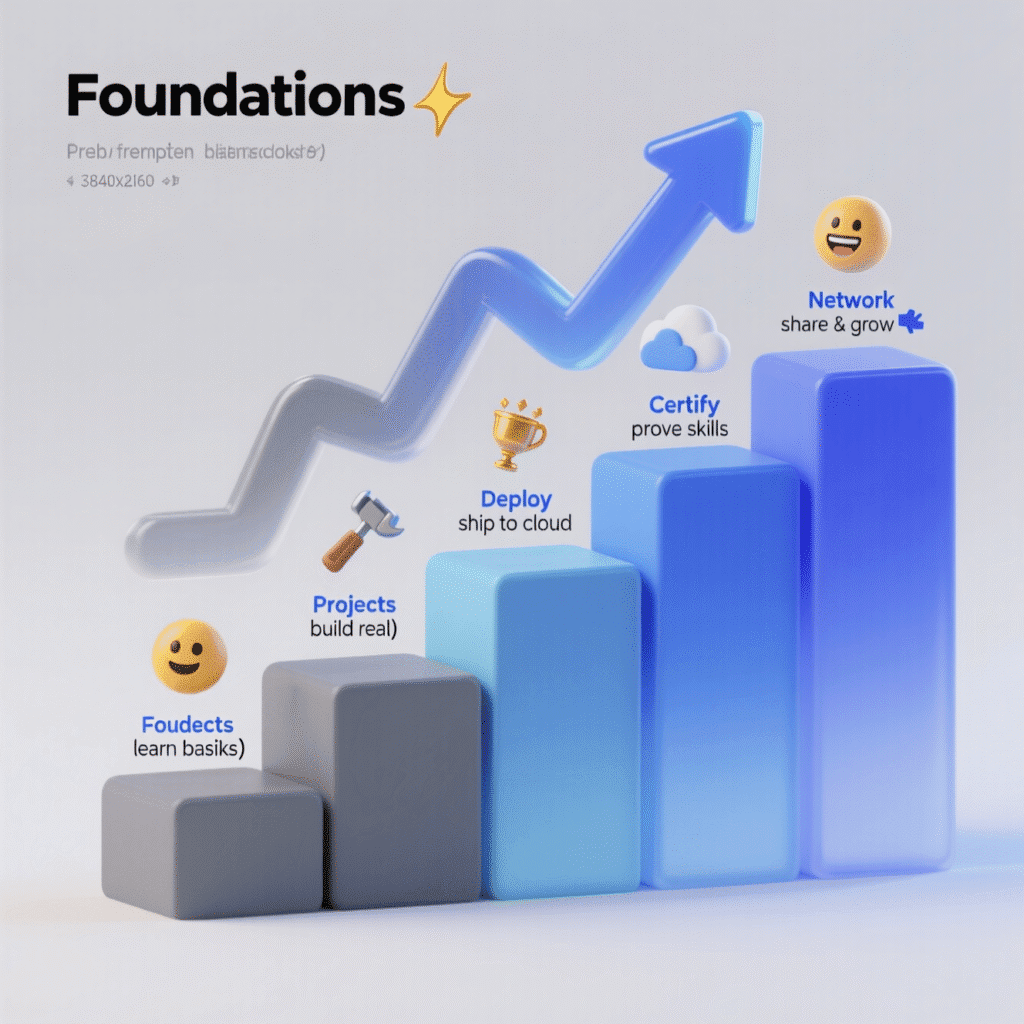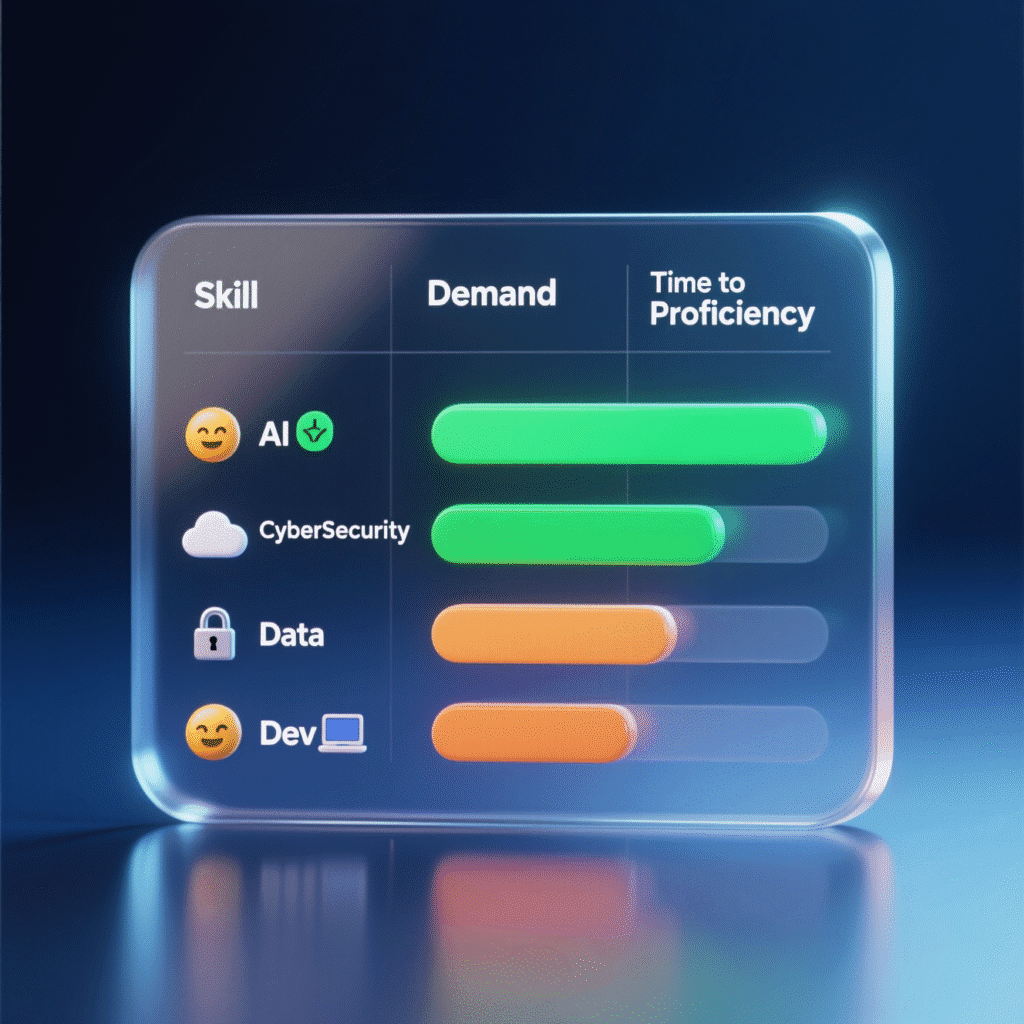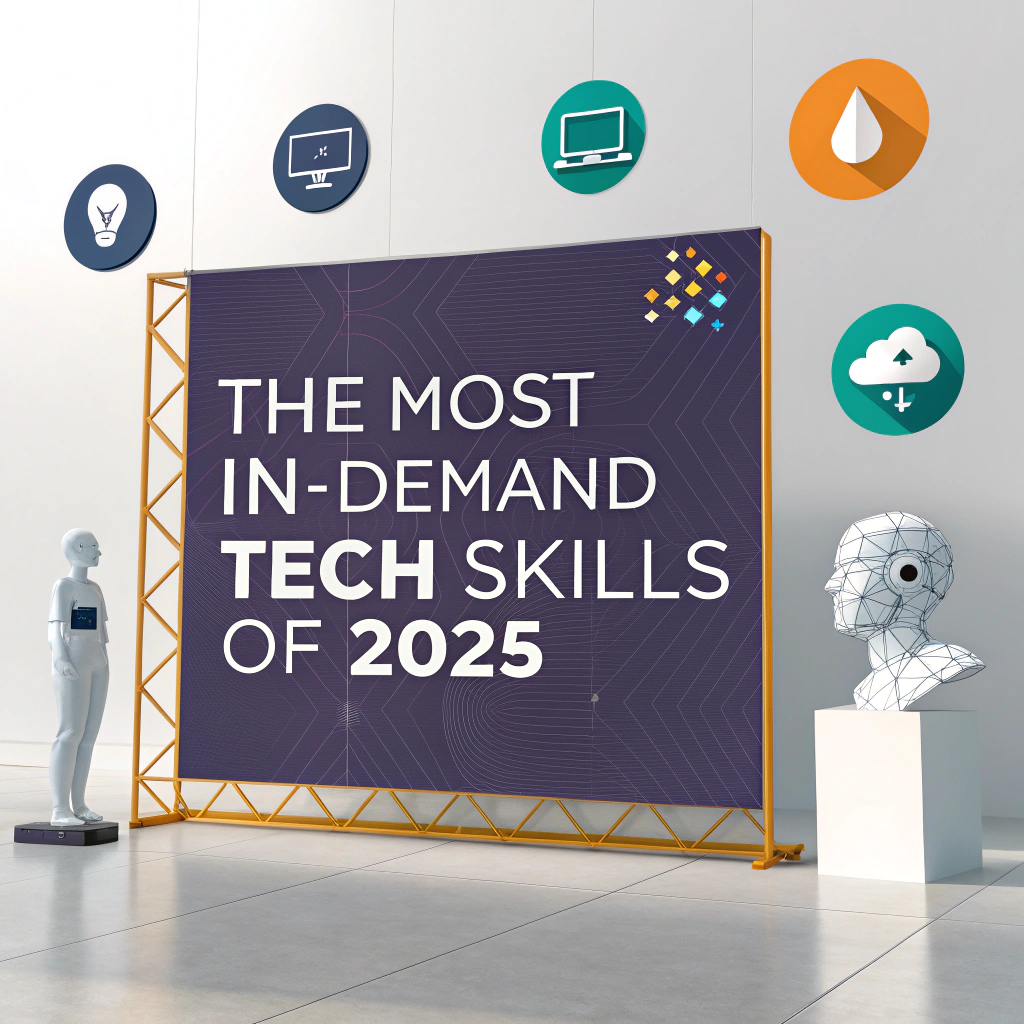Introduction — the one skill behind every winning career

If you pick one phrase to sum up today’s job market, it’s this: adaptability through skills. The single most valuable asset for professionals in 2025 is a set of practical tech skills you can apply tomorrow. Whether you’re switching careers, upskilling while employed, or helping students prepare for real roles, the right technical skills shorten the distance between learning and earning.
In this article I’ll cut through hype and show you the real, employer-backed tech skills that matter in 2025 — why they matter, where the opportunities are, and how to start learning them fast.
What employers actually say (short version)
Across global employer surveys and job-market reports, a few themes repeat: AI and data skills lead the list, cloud and infrastructure skills remain critical, cybersecurity demand keeps rising, and human-centric capabilities (product sense, communication) combine with technical chops to create the highest-value hires. These trends are backed by the World Economic Forum’s Future of Jobs 2025 and large industry studies. World Economic ForumWorld Economic Forum Reports
Quick comparison — top tech skills at a glance
| Tech Skill | Why it’s in demand (real employer need) | Where to start |
|---|---|---|
| AI & Generative AI (prompt engineering, model fine-tuning) | Companies productize AI to automate work and create smarter apps. | Coursera/fast.ai courses, hands-on with OpenAI / Hugging Face. Coursera |
| Data & Analytics (data engineering, ML ops) | Decisions rely on clean data pipelines and reproducible models. | Learn SQL → Python (pandas) → dbt/airflow → basics of MLOps. World Economic Forum |
| Cloud & DevOps (AWS/Azure/GCP, SRE) | Apps scale in the cloud; SRE keeps them reliable and affordable. | Start with cloud fundamentals, then infra as code (Terraform). Stack Overflow |
| Cybersecurity & Privacy | Every company needs security posture and compliance experts. | Intro certs (CompTIA Security+/CySA+) + hands-on labs. World Economic Forum |
| Software Development (modern stacks + Rust/Go) | Core product work — faster languages and web dev skills remain valuable. | Build projects, contribute to open-source, learn testing & CI. Stack Overflow |
| Product & Cloud Automation (APIs, automation scripts) | Businesses want repeatable, automated workflows — not one-off code. | Learn REST, GraphQL and scripting (Python/Node.js). Gartner |
(Each row above maps to employer demand and real hiring signals across 2024–2025 reports.)
Why these tech skills — the data-backed story

Two recent analyst and employer snapshots explain the “why.” The World Economic Forum found AI, big data, networks and cybersecurity to be the fastest-growing skill categories for the next five years — employers report shortages and plan active reskilling. World Economic ForumWorld Economic Forum Reports
Stack Overflow’s developer surveys and market salary data show SRE/cloud engineers and data engineers earn top compensation and are consistently in demand — which matches hiring patterns at scale-up and enterprise firms. In short: skills that keep systems running and make data useful pay very well. Stack Overflow+1
Upwork and major platforms list AI specializations, cloud migration, and automation among the fastest-growing freelance/contract skill sets in 2025 — meaning both full-time and gig work areas are expanding. Upwork Investors
Deep dive — what “AI & data” really means for you
When we say AI in 2025, we don’t just mean “build a model.” Employers want people who can:
- Identify business problems where AI adds measurable value.
- Prepare data pipelines (cleaning, labeling, validation).
- Deploy models reliably (MLOps) and monitor performance.
- Use generative AI safely — prompt engineering, guardrails, and prompt-to-production flows.
Practical path: learn Python + pandas, basic machine learning (scikit-learn), then experiment with fine-tuning small LLMs on Hugging Face and learn tools like MLflow and Docker for deployment. Coursera and industry micro-credentials can accelerate this. Coursera
Cloud & DevOps — the invisible backbone
Product teams ship features — SRE/DevOps keep them running. In hiring panels I’ve joined, engineers who bring cloud automation (Terraform, CI/CD pipelines), observability (Prometheus/Grafana), and incident debugging skills stand out. These are not niche skills — they are the baseline for production systems. If you can design a repeatable deployment that needs less firefighting, you’re extremely valuable. Stack Overflow
Cybersecurity — the constant growth area
Every cloud migration, AI rollout, or third-party integration increases attack surface. Employers now expect basic security hygiene from nearly every technical hire, and dedicated security specialists are paid to harden systems. Learn secure coding, vulnerability scanning, OWASP rules, and basic compliance frameworks — these make you hireable across many roles. World Economic Forum
Soft-technical combo — the X-factor employers want
Reports repeatedly call out “human skills” that pair with tech: problem framing, communication, product thinking, and ethical judgement. PwC and others increasingly screen for curiosity, collaboration, and the ability to translate technical ideas into business outcomes. In short: pair your tech skills with storytelling and you’ll win interviews. The Australian
How to prioritize what you learn (practical roadmap)
- Pick a vertical focus (AI/data, cloud, security, or core development). Depth > breadth.
- Build 2–3 portfolio projects that solve concrete problems (not toy examples). Use public datasets or build a simple web app.
- Learn to deploy: push one project to a cloud provider and instrument monitoring. This is the “show me” skill employers love.
- Certify smartly: entry-level cloud certs (AWS Cloud Practitioner), Google’s Associate cert, or security basics can boost discoverability.
- Network in product terms: on LinkedIn and GitHub describe business outcomes, not only tech stacks.

Table — projected demand vs entry difficulty
| Skill area | Demand (2025) | Time to meaningful proficiency |
|---|---|---|
| AI & Generative AI | Very High. Enterprises investing heavily. World Economic Forum | 6–12 months (project-based learning) |
| Cloud & DevOps | High. Critical for production systems. Stack Overflow | 3–6 months for basics |
| Data Engineering & Analytics | High. Business-critical pipelines. | 6–9 months |
| Cybersecurity | High & growing. | 6–12 months |
| Full-stack development | Steady demand | 6–9 months |
| Product/automation skills | Increasing (bridge roles) Gartner | 3–6 months |
My experience: one small project that paid off
I once built a tiny automation that parsed lecture audio files, extracted dates, and renamed files with readable timestamps — then uploaded them to cloud storage. The automation saved one team hours a week and led to a contract to build a larger pipeline. The lesson: small, practical automation that solves a real pain is more valuable than a pet ML experiment. Focus on business impact and you accelerate career returns.
Where to learn (trusted starts)
- Coursera — courses on AI, data science, and cloud fundamentals. Coursera
- World Economic Forum / industry reports — for labor-market signals and sector moves. World Economic Forum
- Stack Overflow trends — for developer tool and language popularity. Stack Overflow
- Hands-on: GitHub projects, Hugging Face spaces, and cloud free tiers.
Also check our guides on practical projects and tools at PaidScripts: try the /coding-tutorials/ or /elearning-tools/ sections for hands-on starters.
Final thoughts — choose signals not noise
In 2025 the safest bet is a combination: one deep technical skill (AI, cloud, or security), plus the ability to automate and communicate. Employers want people who can reduce risk, scale value, and explain outcomes. That’s the real power of practical tech skills.
Sources & further reading
- World Economic Forum — Future of Jobs Report 2025. World Economic Forum ReportsWorld Economic Forum
- Stack Overflow Developer Survey 2024 (technology & work insights). Stack Overflow
- Coursera — High-income skills articles and course guides. Coursera
- Gartner — Skills and trends for tech providers and enterprises. Gartner
- Upwork — 2025 in-demand skills and freelance trends. Upwork Investors




Pingback: Coursera vs Udemy in 2025: The Ultimate Guide to Choosing Your Learning Path - PaidScripts — Tech Education Hub: Coding, Courses & Student Resources